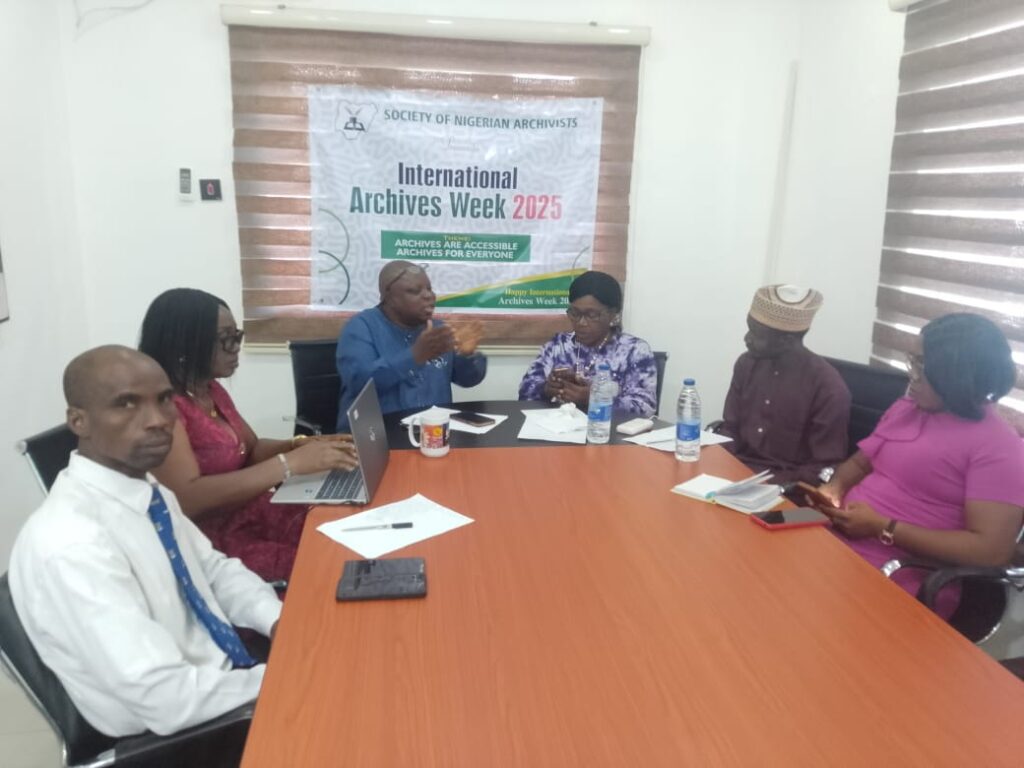The President of the Society of Nigerian Archivists (SNA), Mrs. Yemisi Grace Asaju-Oyebo, has called on the Federal Government to review the National Archives Act of 1992 to align with modern-day challenges in record keeping and information management.
Speaking during a Roundtable Session held at the MAC Centre in Surulere, Lagos, on Thursday, June 12, as part of activities marking the International Archives Week, themed “Archives Are Accessible, Archives for Everyone,” Oyebo emphasized that proper record keeping is essential for national development.
“The National Archives Act was published in 1992 and is now obsolete. I passionately call on the Federal Government to rescue our national archives. In Abu Dhabi, the National Archives is under the presidency. We need professionals in this space, not just civil servants posted there,” she said.
According to her, trained archivists are readily available but underutilized. “We undergo extensive training. We have manpower and expertise, but the government hasn’t been fair to the profession. The Act should be updated to reflect the broader scope of record keeping in Nigeria today,” she added.
She also lamented the condition of Nigeria’s national archives, describing it as disappointing and in need of urgent government intervention.
“If we lose our records, what will our children inherit? The National Archives should be empowered. With the right tools, we will do it right,” Oyebo said, adding that professionals like archaeologists, historians, and librarians should collaborate to advance the profession.
She called on families to contribute personal records to the archives for safekeeping and historical preservation, and urged SNA members to pay dues, attend meetings, and participate in training sessions.
Speaking on the future of archival work in Nigeria, she expressed optimism, noting that the society has been more vocal in the past three years. “We’ve been around quietly for 40 years, but now we’re building a visible presence with platforms like YouTube and Instagram.”
She appealed to leaders at all levels of government to support archiving efforts, stressing the importance of records for accountability, justice, healthcare, and business compliance.
“Proper records are essential for governance, court proceedings, patient care, and business operations. We want archives to be both physically and electronically accessible, with proper control measures for data security,” she said.
On professional development, Oyebo revealed that SNA brings together experts from academia and business, especially those with backgrounds in library science and history. “We’ve taken in young people from library schools, and we have a curriculum committee with professors. We’re working on formalizing our training and seeking accreditations,” she said.
On funding challenges, she noted efforts to reach out to corporate bodies for support. “We are trying our best, especially in advocacy, to educate people on the importance of record keeping,” she added.
Also speaking at the event, Dr. Ifeanyiwa Okafor, SNA’s Welfare Secretary, clarified the distinction between activists and archivists.
“Activists fight for rights, archivists preserve records. Many people even mispronounce the word ‘archivist’ or confuse our work with data management,” she said.
Dr. Okafor shared her experience at Ikoyi Club 1938, where she introduced proper record keeping practices. She stressed that being a record keeper does not automatically make one an archivist, noting that professional training is essential.
“Without good record keeping, there is no sustainable development or good governance. Corruption thrives where there are no records,” she stated.
Dr. Kolawole Oseni, an ex-officio member of the SNA, emphasized the need for archivists to be members of professional bodies such as SNA. He said the SNA is affiliated with the International Council of Archives (ICA) and should maintain comprehensive membership records and publish newsletters.
“We need ethical guidelines, a constitution, a monitoring committee, and support from professionals outside the field such as engineers and lawyers. Our next national conference is coming up before the end of the year, and we need your support,” he said.
Dr. Abdulkareem Aliu Bube, Vice President of the SNA and a lecturer at Ahmadu Bello University (ABU), Zaria, stated that poor public perception of archivists cuts across both northern and southern Nigeria.
“Many people don’t know what archivists do, nor how to pronounce the word. At ABU’s Centre for Historical Documentation and Research, we maintain well-managed archives that preserve records on prominent figures,” he said.
Dr. Bube stressed that archives are essential to development as they serve as primary sources of information. “If government institutions had professionally managed archives, it would greatly benefit the country,” he noted.
In her closing remarks, Mrs. Oyebo urged fellow professionals not to lay all blame on the government. She challenged members to upgrade their skills, obtain higher qualifications, and learn how to effectively communicate the value of their work.
“You must be able to budget, speak with management, and understand your organization’s environment. While working with Shell and First Bank, I advised on digitization as early as 2006. Today, they have Electronic Content Management systems because we advocated for them,” she said.
“Archives can be made accessible if we embrace technology, including AI. Train yourself and show employers what you can do. I’m here today because of my personal investment in professional growth,” she concluded.
Also present at the roundtable was Mr. Samson Izekhome Dalumo, who stressed the need for Nigerians to appreciate and support archivists, urging the country to align with global best practices in record keeping.















